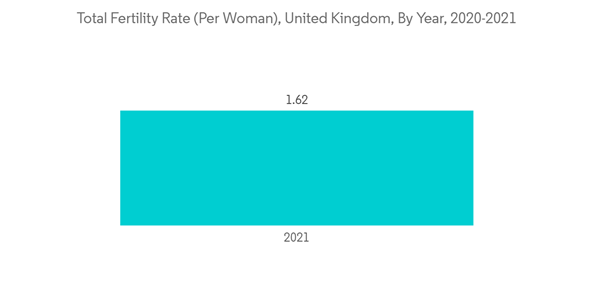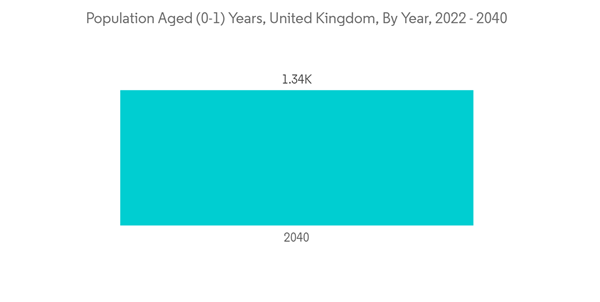The COVID-19 pandemic has impacted the global and United Kingdom healthcare systems. The pandemic also affected the United Kingdom's neonatal and prenatal devices market. For instance, an article published in the book Women and Births in April 2022 reported the effect of COVID-19 infections on perinatal health outcomes, and actions were taken to protect newborn infants. Since newborns are more sensitive to conditions, there was an urgent need for neonatal care devices. Initially, the growth of the studied market was hampered owing to a shortage of neonatal care devices due to COVID-19 regulations, but after the decreasing COVID-19 cases, the market witnessed significant growth.
In the current scenario, the market is expected to witness significant growth due to increasing childbirth in the United Kingdom and the problem associated with delivery such as problems such as preterm birth, preterm premature rupture of the membranes, and, in rare circumstances, maternal mortality; the market is predicted to demand the increased need for prenatal care. Thus, the high need for prenatal care is expected to increase the demand for prenatal devices, thereby propelling the growth of the studied market.
The factors driving the growth of the studied market are the growing burden of preterm births and increasing awareness of prenatal and neonatal care. Preterm birth is when a baby is born too early, before 37 weeks of pregnancy have been completed. The growing burden of preterm births demands advanced prenatal care, thereby driving the growth of the United Kingdom neonatal and prenatal devices market. For instance, an article published in the British Medical Association in January 2022 reported that preterm births affect about 2 to 5 in every 1000 pregnancies in the United Kingdom and varies slightly by country.
Similarly, in 2022 an article published by Preterm Labour reported that preterm birth is a significant global health issue, accounting for approximately 11% of births worldwide, and is the leading cause of morbidity and mortality in babies. In the United Kingdom, about 60,000 babies are born prematurely every year. Most spontaneous preterm births are associated with infection, thus, increasing disorders related to preterm birth demand for improved prenatal and neonatal devices in the United Kingdom, thus driving the growth of the studied market.
Moreover, the increasing awareness regarding neonatal care is also driving the growth of the studied market. For instance, an article published in BioMed Central journal in March 2022 reported a randomized clinical trial conducted in a few hospitals in the United Kingdom and Ireland. This study aimed to increase awareness of reduced fetal movements (RFM) and implement a care pathway when women present with reduced fetal movements. Thus, such studies and interventions are making the population more aware of prenatal, thereby increasing the demand for neonatal incubators and driving the segment's growth.
Furthermore, new product launches, mergers, acquisitions, and partnerships among key market players are fueling the studied market's growth. For instance, in February 2021, Medtronic plc completed its study on Newborns using Nellcor Pulse Oximetry Technology and revealed that the stable signal was obtained from all 60 newborns with the Nellcor pulse oximeter, thus suggesting this device is a simple, noninvasive bedside monitoring device for neonates in the detection of oxygen saturation levels and heart rate. The device is available in the United Kingdom, including various other countries. Thus, such product launches are providing better care to newborns and thus driving the growth of the studied market.
Thus, due to the growing burden of preterm births and increasing awareness of prenatal and neonatal care, the studied market is expected to witness significant growth over the forecast period. However, low birth rates may slow down the development of the studied market.
UK Neonatal & Prenatal Devices Market Trends
Incubators Segment is Expected to Witness a Significant Growth Over the Forecast Period.
Incubators are one of the major contributors to neonatal care equipment as they are often necessary for infants. The infants need respiratory support, ranging from extra oxygen to continuous positive airway pressure (CPAP) or mechanical ventilation. The temperature regulation of infants is among the significant factors to be controlled in neonatal incubator cases. The growth in the incubator segment is also attributed to the rising incidences of neonatal hypothermia, the increasing number of neonatal intensive care unit (NICU) admissions, and the surge in awareness regarding neonatal care.The increasing number of births in the country also demands a growing number of incubators. For instance, in February 2022, the United Kingdom Statistics factsheet reported 624.8 thousand live births in England and Wales in 2021, an increase of 1.8% from 613.9 thousand in 2020. Thus, increasing deliveries in the country's demand for prenatal incubators is driving this segment's growth.
Furthermore, technological developments and product launches are anticipated to boost the growth of this segment over the forecast period. For instance, in November 2021, mOm's revolutionary designed, developed, and manufactured neonatal incubator in Britain and reported its first-ever clinical use in a United Kingdom hospital. The mOm's incubator was initially conceived to save the lives of premature babies. Thus, such developments are driving the growth of this segment.
Also, neonatal hypothermia is a progressive reduction in the axillary temperature of the newborn. The increasing cases of neonatal hypothermia are driving the demand for neonatal incubators to maintain their temperature. For instance, in December 2021, UNICEF reported that 2.7 deaths per 1000 live births were reported in the United Kingdom in the year 2020. Thus, to overcome the prenatal deaths caused by hypothermia, the demand for incubators increases, thereby driving the growth of this segment.
Thus, the segment is expected to witness significant growth over the forecast period due to the increasing number of childbirths and new product launches.
Ultrasound Devices Segment is Expected to Witness a Significant Growth Over the Forecast Period.
The ultrasound devices segment is expected to witness significant growth over the forecast period owing to increasing complications during childbirth, examining the fetal heart, and examining facial abnormalities or neural tube defects.The increasing awareness of prenatal care in the United Kingdom and the efficiency of ultrasound devices for detecting fetal complications are fuelling the growth of this segment. For instance, in January 2022, an article published by, the United Kingdom factsheet reported increasing concern about childbirth defects. The article also quoted the use of proper diagnostic devices, like ultrasound that can detect complications in a child during the womb, which reduces the cases to a significant number. Thus, increasing awareness about childbirth defects is driving the growth of this segment.
Similarly, a high number of the child are born every year in the United Kingdom. For instance, in 2022, United Nations reported that about 1.3 thousand children were there in the United Kingdom in the age group of (0-1) years in the year 2022. Thus, there may be an increased risk of illness in these children, which may increase the demand for ultrasound devices, thereby fueling the growth of this segment.
Furthermore, technological developments are fueling the growth of this segment. For instance, in May 2022, GE Healthcare invested USD 50 million in the Israeli start-up Pulsenmore. This investment is aimed at accelerating the global adoption of Pulsenmore’s homecare ultrasound solutions. The product will get distributed in Europe, including the United Kingdom. The purpose of this remote ultrasound device is to make ultrasound accessible in United Kingdom for improving maternal health and thus contributing to the growth of this segment.
Thus, due to increase in awareness about prenatal care and new product launches is driving the growth of this segment over the forecast period.
UK Neonatal & Prenatal Devices Market Competitor Analysis
The market studied is moderately competitive and fragmented due to various small and large market players. The competitive landscape includes an analysis of a few international as well as local companies which hold market shares and are well-known as General Electric Company (GE Healthcare), Carl Bennet AB (Getinge AB), Koninklijke Philips NV, Masimo, Medtronic PLC, Natus Medical Incorporated, Phoenix Medical Systems Ltd, Vyaire Medical, Cardinal Health Inc, Dragerwerk AG & Co. KGaA, Ambu A/S and Utah Medical Products, Inc.Additional benefits of purchasing the report:
- The market estimate (ME) sheet in Excel format
- 3 months of analyst support
This product will be delivered within 2 business days.
Table of Contents
Companies Mentioned (Partial List)
A selection of companies mentioned in this report includes, but is not limited to:
- General Electric Company (GE Healthcare)
- Carl Bennet AB (Getinge AB)
- Koninklijke Philips NV
- Masimo Corporation
- Medtronic PLC
- Archimed SAS (Natus Medical Incorporated)
- Phoenix Medical Systems, Ltd.
- Vyaire Medical, Inc.
- Cardinal Health, Inc.
- Dragerwerk AG & Co. KGaA
- Ambu A/S
- Utah Medical Products, Inc.










